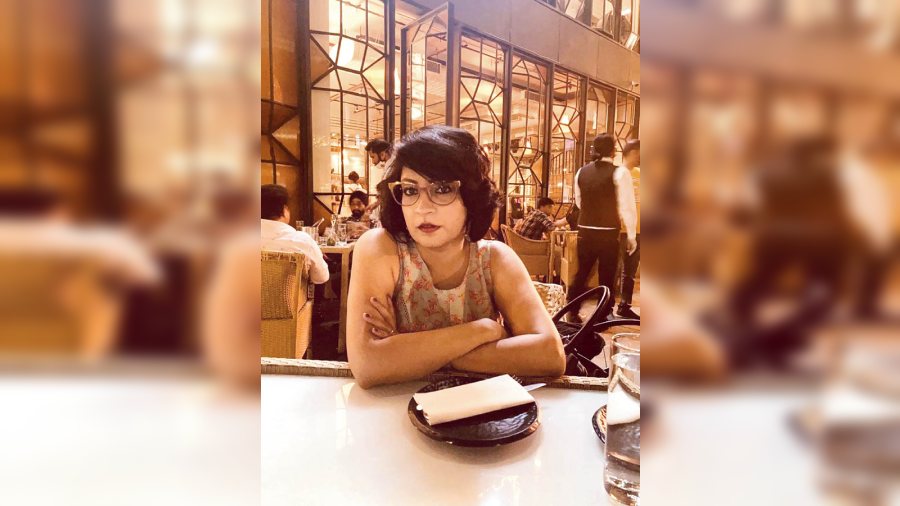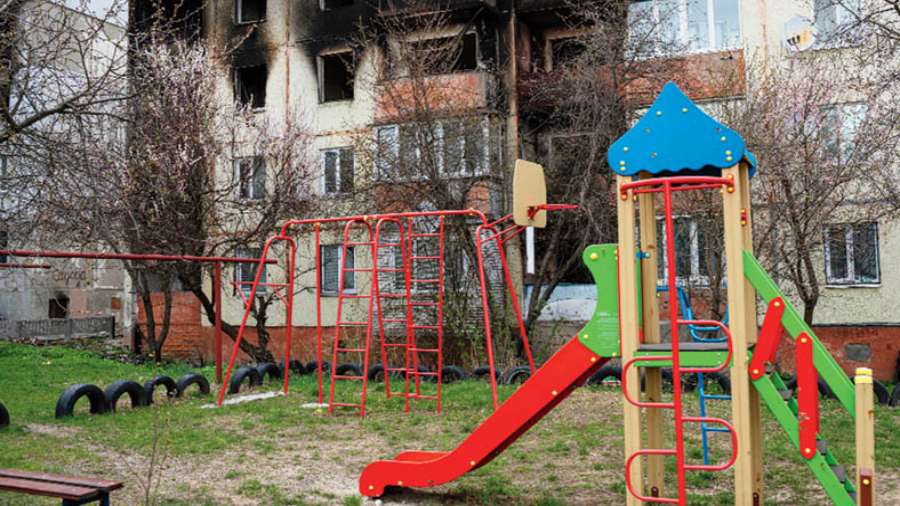I found her sitting next to a neatly drawn hopscotch court, pensively considering the twilight sky. I sat next to her, curling her long hair around my fingers, sniffing her neck. Evening flights rumbled past. Do you think satellites can see this? she asked me. Depends, I said and left my answer hanging in the scratchy summer heat, disappearing into the noise-cancelled space of a virtual meeting. I was probably going to say, depends on which satellite and whether you mean they can see you, little girl sitting on the front steps,or the city or Earth, or the swirls of pollution that hang over us.
Later, the meaning of her question descended on me like a Tochka missile.The chalk-drawn hopscotch court was her recreation of the Mariupol theatre in Ukraine, children written in gigantic Russian letters on the pavement outside. An appeal and warning to the fighter jets — children are sheltering here, surely you will spare the bomb. My seven-year old was slipping into the shoes of her counterparts in a faraway country. She was decoding the war.
Since the start of Russia’s invasion of Ukraine, there has been no dearth of access to information. We are consuming this war not only through mainstream media but also through anecdotes, citizens’ videos, vlogs by teenagers, CCTV footage. Drone videos, shot on ground or from the sky, have made this invasion personal, accessible, and intimate — far more than say, the war in Syria, Libya or South Sudan. I realised that I have without any censorship, shared much of it with my children. I have watched with them the video of a pianist playing Chopin one last time on her beloved instrument, her house bombed and crumbling all around her. We have pored over the CCTV footage of a lone woman in Bucha, trying to escape on her bicycle, shot down by Russian tanks. On film nights, they have had to choose from a curated menu of The Boy in the Striped Pajamas, Grave of the Fireflies and Persepolis. We have spent our Sundays talking about other wars, about the slipperiness of good and bad, about children being at the heart of all conflicts. Without compunction, I threw my children into the deep end of the pool. I made lightness disappear. I brought home war.
But is that the only way to prepare your child for a world where war in some form or the other is a norm? How do you talk to them about sides, human rights, war crimes? More importantly, is it fair to drag a war that is not impacting their immediacy, into their safe spaces? To seek answers, I went opinion shopping, fully aware of the backlash that might come my way for being so hot and bothered about the Ukraine war specifically, for not asking pointed questions instead about NATO and American meddling, or the Syrian War, or the fires that burn in our home turf. Posting a disclaimer that my query did not stem from American love or Russian love, but because every war is a war on children and children don’t take sides or benefit from any of it, I fielded the questionnaire. Overcoming my phobia of WhatsApp forwards and shares, I circulated it amongst friends (sample skew alert!), parent groups (different needs and tactics for different ages), a few distant connections (to correct the skew!) and strangers thrown in the mix. My partner, subject to my gloomy foretelling every morning over tea, waited eagerly for the responses to pour in. I braced myself to be told that I needed time-out at a correctional facility due to the distinctly sadistic overtones in my parenting style.
More than 63 per cent of the parents I reached out to are talking to the children about war. A handful felt that it was too early, that the arcadia should be preserved for as long as possible. One parent, even though her child is 2.5 years old, took the survey because she wanted to record her views —“Right now he doesn’t have the linguistic or spatial capability to understand. But in future I will, about this war and other wars.” The fact that war is no longer local, that all of us are in it together no matter where the bombs are falling, is something that parents felt was an important message to convey. There were other musings on the ongoing pandemic as the Mother of all Wars, the need to talk about destruction of cities and monuments as irreparable losses, that war-mongers are bad people, frustrations with the UN and other global mechanisms, the irrelevance of NATO. It is notable that about 26 per cent parents are avoiding a tete-a-tete on the topic or feel it is not relevant. While some are skipping the war-talk for the time being because their children are young, there are others who feel that children are already traumatised due to Covid and need to be spared from further trauma.
To my question whether the pandemic has prepared our children for conflict, the opinion is divided almost equally — 52 per cent say it has, while 47 per cent feel otherwise. Similarly, the jury is still out on the question of whether children should be shown or allowed to see images of the war. The pie chart on this one has been a shape shifter. It went through highs and lows and then ultimately settled for a neat 50-50. Half of the parents felt that children should have a visual understanding of the war, while the other half didn’t want that. The group that shied away from painting a more graphic picture of war was understandably those with younger children. Let’s shield them till we can — was the majority opinion. One parent talked about showing their child a cartoon representation of war, while another said she was reading a book on Nazis with her child. Parents of children 12 years and above have distinctly different needs and hopes — they are looking for triggers and props, anything that can elicit from their tweens and teens a show of greater interest in the real world. Could survival stories in a real war — such as the 11-year-old boy who walked 1,000km all alone to the Slovakian border — dull the virtual war-thrills of a gaming universe? They are taking this opportunity to impart survival lessons and coin slogans — “War ahead! Use brain more!” “War makes no one happy, best avoided” — consequentialism and utilitarianism colliding in a heady mix.
This poll was a reminder that in the last two years, the social contract of parenting has undergone a complete overhaul. As have the ideas of innocence, censorship of violence, political baptism, thresholds of digital access. War-talk or conflict-talk is here to stay as a survival and deep adaptation tool. How we walk that talk will vary — it will be as rainbow coloured and polarised as our lives and opinions are currently. But that’s one chapter added to your curriculum as a parent and from that there is no running away. Chastised and validated in equal parts, I will no longer insist on games like ‘put together your escape bag in five minutes flat’ or recommend a creative writing Saturday on war crimes. I am hunting other ways — age-appropriate and timeless — like head banging to Zombie by The Cranberries, humming Lennon and Joan Baez, invoking with Indian Ocean, dedicating talent fiesta performances in school to the Children in War. We are remembering not to forget. For now, it will do.

The author is a writer with a day job in global policy
